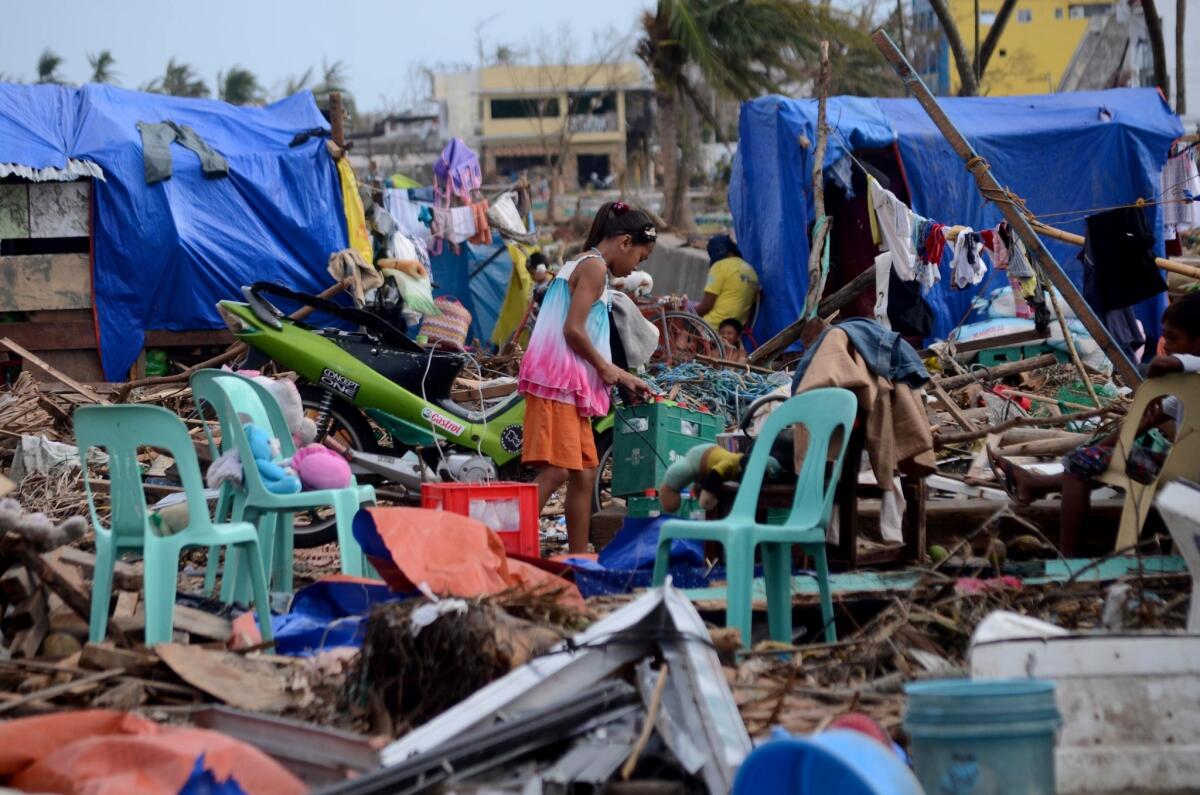Lesson of Typhoon Haiyan: Tackle climate change, or it will tackle us

- Share via
Was man-made global warming responsible for Typhoon Haiyan? Or Superstorm Sandy? Or the recent flooding in Colorado?
I don’t know. Neither do you. Neither do the scientists, really. It’s impossible to pin a specific weather event on climate change.
But that doesn’t mean there’s not an important lesson to be learned from Haiyan: Too many people live in places that are vulnerable to extreme weather, and whether or not extreme events are tied to climate change, that’s going to be an expensive and deadly problem.
On Monday, The Times’ Tony Barboza laid out the grim details, taken from a leaked report drafted by the United Nations-backed Intergovernmental Panel on Climate Change:
Climate change will disrupt not only the natural world but also society, posing risks to the world’s economy and the food and water supply and contributing to violent conflict, an international panel of scientists says.
“We see a wide range of impacts that have already occurred ... on people, ecosystems and economies,” said Chris Field, a scientist at the Carnegie Institution for Science and co-chairman of the group writing the report. “Looking into the future, we see increasing risks that are more pervasive and more severe with greater amounts of climate change.”
Of course, when a major typhoon like Haiyan hits the Philippines, or Sandy hammers the East Coast, or the Rim fire torches the Sierra or Hurricane Katrina swamps New Orleans, we call these events “natural disasters” or even “acts of God.” And then we politicize the whole climate change issue, as if being a tea party Republican will protect you from the next hurricane, flood or fire.
I once heard Rush Limbaugh on the radio pooh-poohing climate change and talk of more, stronger hurricanes threatening Florida. There have always been hurricanes, he said; Floridians ride them out; some are worse than others, but so what? Which ignores the fact, of course, that millions more people now live in Florida than “back in the day,” and many of them live in beautiful — but vulnerable — coastal areas.
The same is true in California. Who doesn’t want to live beachside — until a big winter storm sends waves crashing into your living room.
So here’s what I’d like: A political truce, if you will, on climate change. Even if we all can’t agree on that topic, there should be some nonpolitical environmental topics we can agree on. Here are three to start:
- Polluting the air isn’t good for people or the planet.
- Ditto our water.
- Sensible building codes aren’t anti-business; they’re necessary to protect life and property.
California’s air is cleaner today because of environmental regulations. Our water too. And our buildings are safer from earthquakes because of tighter building codes. We’ve shown it can be done. Other states, other countries, can do it too. (Are you listening, China?)
A lot of people are dead in the Philippines today. A lot more have lost everything. For them, it’s too late to do something about climate change.
So for them, and for future victims, let’s forget the politics. Let’s just be sensible.
ALSO:
The U.S. Army discovers Africa
Goldberg: Watch out, your character is showing
The cure for retailers ruining Thanksgiving: A federal blue law
Follow Paul Whitefield on Twitter @PaulWhitefield1 and Google +
More to Read
A cure for the common opinion
Get thought-provoking perspectives with our weekly newsletter.
You may occasionally receive promotional content from the Los Angeles Times.











